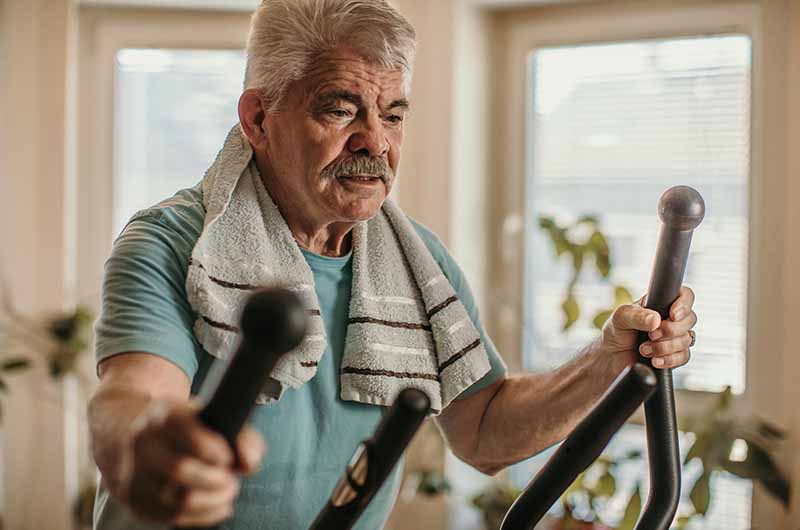New study shows home-based cardiac rehab can save lives for U.S. veterans

New research suggests that U.S. veterans taking part in home-based cardiac rehabilitation after a heart attack or heart procedure might have a lower chance of dying than those who decline the treatment altogether. The study, published in March 2023, in the Journal of the American Heart Association, found that more than half of eligible veterans don't participate in the program.
The study’s results mirror national trends showing cardiac rehabilitation — usually provided at medical facilities — is severely underused. However, the authors said this new study was the first to provide evidence that home-based cardiac rehabilitation could also improve survival rates.
Cardiac rehabilitation is a structured program supervised by medical staff to help improve your heart health after experiencing a heart attack, angioplasty, heart surgery or heart failure. Cardiac rehab offers exercise guidance and training, education for living a heart-healthy life, and counseling to reduce stress.
"As technology expands, behavior modification in a participants' home environment may help make cardiac rehabilitation more accessible, and lifestyle changes more sustainable," senior study author Dr. Mary A. Whooley said in a news release. Whooley is a primary care physician at the San Francisco Veterans Affairs Medical Center and professor of medicine at the University of California, San Francisco. Whooley said that home care could also have shorter wait times than facility-based care programs, which can have limited availability. Although, cost could be a potential obstacle. "Our biggest challenge in the U.S. is that home-based cardiac rehabilitation is not covered by many health insurers," she said. "Currently, Medicare only pays for on-site or facility-based cardiac rehabilitation."
Research has shown that cardiac rehab can lower the chances of dying and going to the hospital for people with heart issues such as heart attacks or heart failure. The American Heart Association and the American College of Cardiology recommend that these patients should attend cardiac rehabilitation programs.
The Centers for Disease Control and Prevention and the Centers for Medicare and Medicaid Services worked together in a project called the Million Hearts Cardiac Rehabilitation Collaborative, which found that if 70% of people who had heart problems and were hospitalized participated in these programs, it could save 25,000 lives and prevent 180,000 hospital stays each year. However, research has also found that many people don't take advantage of these programs.
In 2020, researchers studied Medicare beneficiaries and found that only 1 in 4 people decided to participate in cardiac rehabilitation programs held at a facility. But researchers suspect that home-based care has more significant potential than facility-based services in helping people make long-term behavior changes. Some studies show that integrating healthy behaviors into a person's home routine can increase adherence to those behaviors.
For the recent JAHA study, researchers set out to investigate whether an at-home option boosted participation. They looked at the medical information of 1,120 veterans who received treatment at the San Francisco VA Medical Center between August 2013 and December 2018 for heart-related issues like heart attacks, angioplasty and coronary bypass surgery and offered them the choice to join a 12-week cardiac rehabilitation program that they could do at home after leaving the hospital. The program provided support through coaching calls, interviews to keep them motivated, a workbook, and a personal health journal to track essential things like vital signs, exercise and diet.
The scientists also gave the veterans, mostly men around 68 years old, tools like a blood pressure monitor, scale, and stationary bike to use at home. The veterans received personalized help from a nurse or exercise specialist, and the researchers checked in with them every three and six months for about four years.
Surprisingly, only 44% of the veterans decided to join the home-based program. However, after one year, those who didn't participate had twice the death rate compared to those who did participate in the home-based program. And, throughout the study, the cardiac rehabilitation program participants had around 36% lower death rates.
Even though the option to do rehab at home seemed more appealing, the researchers were still puzzled by why many veterans chose not to participate. Dr. Whooley suspects they didn't want to change their habits, even when they were given a chance to do the rehab at home in a way that suited them.
It's important to note that the study mainly included older men who spoke English, so it's unclear if women or people who don't speak English would have the same survival benefits from home-based cardiac rehabilitation.
Dr. Randal J. Thomas, who works with a cardiac rehabilitation program at the Mayo Clinic in Minnesota, called this study an important and significant report. He said it provides valuable insights into cardiac rehab. "Even though the study did not clarify if home-based cardiac rehabilitation impacts death rates as well or even better than center-based rehabilitation," he said, "it does show that home-based cardiac rehabilitation reduces death rates compared to those patients who do not participate in cardiac rehabilitation."





